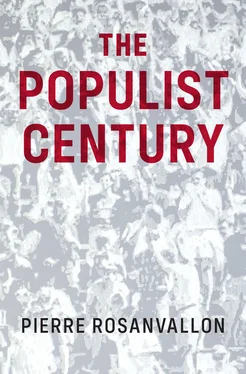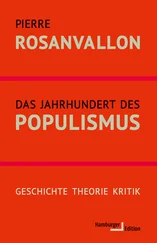The designation of an “enemy of the people” is not based on a simple acknowledgment of opposing interests or of competition for power. It also has an instinctual dimension, based on a sense that the “enemy” sets itself apart, displays contempt, lacks compassion. Populist movements strongly emphasize the power of affects in political mobilization: they help promote the feeling that worlds foreign to one another are in confrontation and that the barriers between “them” and “us” are insurmountable. These movements invoke the lack of humanity on the part of a “caste,” an “elite,” or an “oligarchy” in order to justify and legitimize the hatred manifested toward these enemies, who are perceived as having seceded, morally and socially, from the common world. Hence the virulence of the diatribes against those who “stuff themselves” at the expense of the people, the stigmatization of the “financial wizards” who “pig out,” “gorge themselves” with riches, and cut themselves off from their fellow citizens in countless ways. The figures of the politician, the billionaire, and the technocrat are superimposed and denounced as similarly execrable.
The word “people” is thus particularly meaningful today because it gives voice to something that many citizens feel in a confused way, whereas the concepts of traditional sociology, the statistical vocabulary of socio-professional categories, or the criteria of administrative forms strike these citizens as belonging to dead languages, remote from their own lives and experience. The divide between the “top” and the “bottom” of society is thus also perceived in an existential mode. The elites are accused of living in a world that does not know what is happening at its gates. And “the people” is defined, in a mirror image, as the world of men and women who remain nameless in the eyes of the important figures, the elites. The social fracture is thus also identified with a “cognitive distance” – with the gap between the “statistical truths” that the governing authorities put forward in order to qualify the state of society, on the one hand, and the living conditions people actually experience, on the other. The ordinary individual in fact has nothing to do with the average person in today’s society: he or she is always a particular individual.
The positive redeployment of the word “people” is inscribed in this context. Its new use no longer refers to a political abstraction or to a faceless crowd. In its very indeterminacy it seems open to the perceptible, concrete life of each person. It gives collective form to a society of individuals while welcoming singularities – all the more so in that its glorious history ennobles, in a way, the position of those who feel dominated, invisible, or locked into the specificity of their conditions. One can thus claim with pride that one is part of “the people,” whereas one can feel vaguely ashamed to be defined by reductive criteria (being unemployed, living on the minimum wage, having a hard time making ends meet, lacking higher education, and so on). Membership in “the people” allows one to cry out in anger and to display noble tendencies at the same time.
The use of this advantageous and divisive identification allows for a return to rhetorical figures and expressions of passion that revive the old revolutionary aversion to the privileged figures considered alien to the nation, along with the type of demonization of foreigners that has often been observed in wartime. Moral disqualification also plays an essential role in the way everyone deemed corrupt, in the various senses of the term, can be seen as forming a single bloc. Conversely, those counted among “the people” are seen as virtuous, sensitive to the suffering of others, hard-working and self-supporting. In France, Jean-Luc Mélenchon has explicitly appropriated this populist discourse; the parallel with Robespierre’s is striking. 7The parallel is also clear in the way political adversaries are characterized as foreign agents, described as agents of international capitalism, a globalized multiculturalism, or a technocratic Europe that flouts national sovereignties; the term “neoliberalism” sums up in a single word the political and social culture of the enemy “caste.” More generally, the word “people” is two-faced, like Janus. It resounds with the idea of a certain moral grandeur even as it justifies murky hatreds. 8It constructs the political field in such a way that the adversary must necessarily be an enemy of humanity. It serves as a label for discontent even as it indicates the pathway to a certain type of change.
From these various standpoints, populist movements seek to restore perceptible consistency to the invocation of a people as one body that has become unlocatable, a reference that was previously just a “floating signifier” or even an “empty signifier,” to return to Ernesto Laclau’s terminology. This way of “constructing a people” 9obviously raises a number of questions; we shall return to these in part IIIof this book, where we shall explore the conditions for an appropriate critique of populism. But it is important to note that this approach has the advantage of reducing the split or at least the tension between the notion of the people as a civic body and that of the people as a social group. The two in fact coincide, in that they both relegate the governing authorities and the various types of elites or oligarchs to the same category: that of caste, for example. The revitalization of democracy and the improvement of living conditions thus depend, in the populist perspective, on the simultaneous rejection of that small, unified group of enemies of the people; social struggle and political confrontation are conflated. 10This is what gives the movement its strength.
1 1 On this point, see the developments in my 2018 seminar at the Collège de France, “Les années 1968–2018: Une histoire intellectuelle et politique (suite et fin)”: https://www.college-de-france.fr/site/pierre-rosanvallon/course-2017-2018.htm.
2 2 I address this issue in my book Le peuple introuvable: Histoire de la représentation démocratique en France (Paris: Gallimard, 1998).
3 3 Chantal Mouffe, For a Left Populism (London: Verso, 2018), pp. 5–6.
4 4 Ernesto Laclau, “Logiques de la construction politique et identités populaires,” in Jean-Louis Laville and José Luis Coraggio, eds., Les gauches du XXIe siècle: Un dialogue Nord–Sud (Lormont: Le Bord de l’eau, 2016), p. 151. This essay consists in excerpts from Laclau’s On Populist Reason (London: Verso, 2005) and offers a good summary of that volume.
5 5 Laclau, “Logiques de la construction politique et identités populaires,” pp. 152ff.
6 6 See Benoist’s article “Ernesto Laclau: Le seul et vrai théoricien du populisme de gauche,” Eléments, no. 160 (May–June 2016): https://www.breizh-info.com/2016/05/15/43439/sortie-magazine-elements-n160-suis-guerre/.
7 7 See Mélenchon’s dialogue with Marcel Gauchet in Marcel Gauchet and Jean-Luc Mélenchon, “Robespierre, le retour?” Philosophie Magazine, no. 124 (October 2018): https://www.philomag.com/archives/124-novembre-2018(Gauchet had just published Robespierre, l’homme qui nous divise le plus [Paris: Gallimard, 2018].) See also Jean-Luc Mélenchon and Cécile Amar, De la vertu (Paris: Éditions de l’Observatoire, 2017).
8 8 The defense of the dignity of one’s identity can be expressed, for example, through a rejection of religions deemed “foreign” (as Islam is rejected in today’s France).
9 9 Construire un peuple is the title given by Chantal Mouffe to a book written in French in collaboration with Íñigo Errejón, the leader of Podemos in Spain. It has been published in English as Podemos: In the Name of the People, trans. Sirio Canós Donnay (London: Lawrence & Wishart, 2016).
Читать дальше












